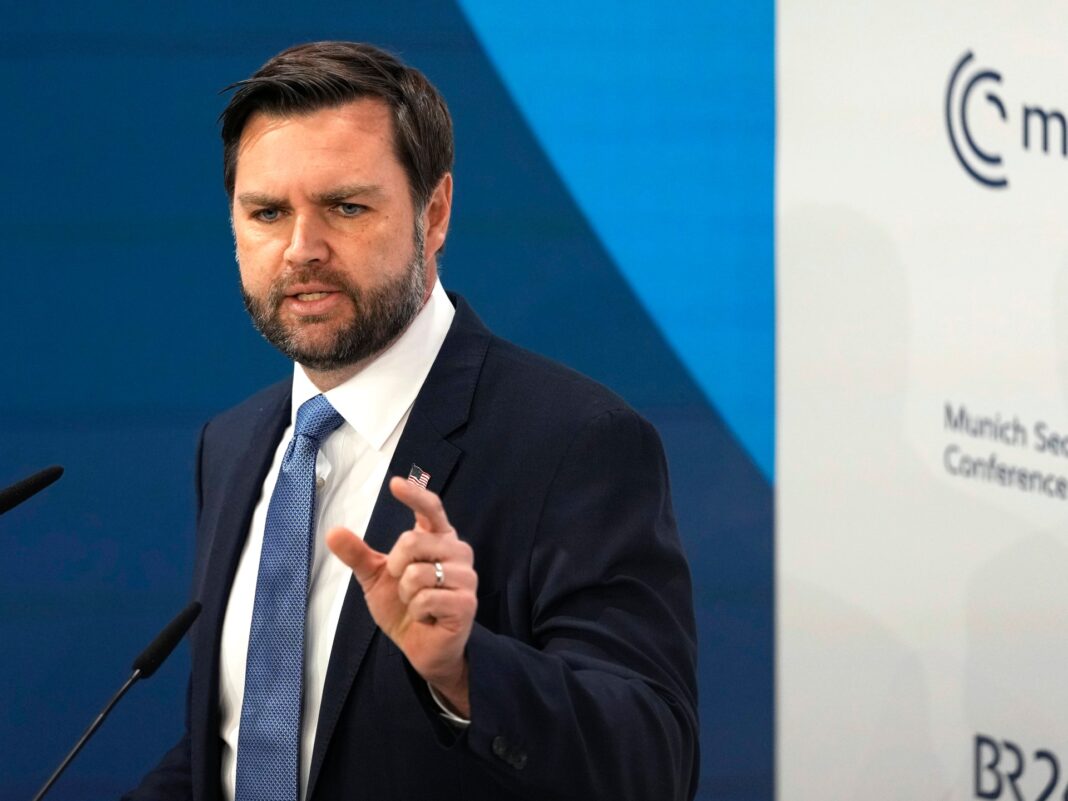United States Vice President JD Vance has taken aim at European countries during his first international trip, accusing leaders of rollbacks on free speech, lax migration policies and delinquency in their defence commitments.
In a speech at the Munich Security Conference in Germany on Friday, Vance announced that the administration of President Donald Trump would mark a pivot in terms of the US relationship with its European allies.
“There is a new sheriff in town under Donald Trump’s leadership,” Vance told an audience of political leaders, military officers and diplomats at the annual conference.
He proceeded to accuse European leaders of censoring social media, interfering in elections and violating the rights of Christians.
“I believe that dismissing people, dismissing their concerns or, worse yet, shutting down media, shutting down elections or shutting people out of the political process protects nothing,” Vance said. “In fact, it is the most surefire way to destroy democracy.”
Vance’s remarks garnered a swift rebuke from some officials. Speaking shortly afterwards, German Defence Minister Boris Pistorius said he could not let Vance’s claims go unanswered.
“If I understood him correctly, he is comparing conditions in parts of Europe with those in authoritarian regimes,” Pistorius said. “That is unacceptable, and it is not the Europe and not the democracy in which I live and am currently campaigning.”
What did Vance say?
Multiple countries received jabs and swipes in Vance’s first major international speech.
The US vice president, for example, singled out Romania for cancelling its elections in December over alleged Russian meddling and condemned Sweden for convicting an activist of a hate crime for staging public burnings of the Quran.
He also accused the United Kingdom of backsliding on religious rights for its arrest of an activist who refused to leave a protected area outside an abortion clinic.
When it came to the conference’s host country, Germany, Vance criticised a consensus among mainstream political parties not to work with the far-right, anti-immigration group Alternative for Germany (AfD). That policy of political isolation has been dubbed a “firewall”.
“Democracy rests on the sacred principle that the voice of the people matters. There’s no room for firewalls,” Vance said.
He added that such policies prevent dialogue and broadly accused European leaders of working to silence the voices of those they disagreed with.
“Now, to many of us on the other side of the Atlantic, it looks more and more like old entrenched interests hiding behind ugly Soviet-era words like ‘misinformation’ and ‘disinformation’, who simply don’t like the idea that somebody with an alternative viewpoint might express a different opinion,” Vance said.
In his response, Pistorius, the German defense minister, noted that the AfD has been able to campaign and spread its messages just like any other political party in Germany.
“Democracy doesn’t mean that the loud minority is automatically right,” said Pistorius, who is a member of the Social Democratic Party of Germany. He called the AfD “partly extremist”.
“Democracy must be able to defend itself against the extremists who want to destroy it.”
Still, Vance himself was seen to embrace anti-immigrant rhetoric in his speech at the Munich conference.
“Of all the pressing challenges that the nations represented here face, I believe there is nothing more urgent than mass migration,” Vance said.
By way of example, he pointed to Thursday’s car-ramming attack in Munich, which injured 36 people. The suspect is a 24-year-old Afghan man.
“How many times must we suffer these appalling setbacks before we change course and take our shared civilisation in a new direction?” Vance asked.
“No voter on this continent went to the ballot box to open the floodgates to millions of unvetted immigrants.”
Wider reset
The US vice president’s inaugural trip to Europe comes less than four weeks after Trump began his second term on January 20, vowing a reset in relations with the US’s European allies.
Former President Joe Biden had sought to rebuild those ties following the end of Trump’s first term, from 2017 to 2021. Talks in recent years have largely focused on shared security threats from Russia and China.
But swift changes in the opening weeks of Trump’s second term have left European leaders reeling.
Earlier this week, Trump announced sweeping 25-percent tariffs on steel and aluminium imports, slated to take effect on March 12. On Thursday, he also ordered his advisers to calculate reciprocal tariffs on any country deemed to have unequal trade ties with the US.
And the changes have extended beyond US economic ties. Trump has also sought to drive negotiations for an end to Russia’s war in Ukraine, a pivotal security issue for the rest of Europe.
On Wednesday, Trump held a call with Russian President Vladimir Putin, stoking concerns that European countries and Ukraine could be sidelined in discussions to end Russia’s invasion.
US Defense Secretary Pete Hegseth also told allies in Brussels, Belgium, that Ukraine must accept it will not eventually become a NATO member, nor is it likely to win back territory lost to Russia since 2014.
Critics have said the statements amount to major concessions to Moscow ahead of any formal peace talks.
Vance’s visit to Munich on Friday also included a meeting with Ukrainian President Volodymyr Zelenskyy.
“Our first meeting — not last, I’m sure,” Zelenskyy said afterwards, pledging to “continue our meetings and our work”.
In a separate meeting with German President Frank-Walter Steinmeier, NATO Secretary-General Mark Rutte and British Foreign Secretary David Lammy, Vance also renewed calls for European countries to boost their defence spending.
The Trump administration has called for NATO members to spend 5 percent of their gross domestic product (GDP) on defence.
Many countries currently struggle to meet the current 2 percent commitment. The US currently earmarks about 3.4 percent of its GDP for defence spending.
Vance said he wants NATO to do “a little bit more burden sharing in Europe” so that the US could put its focus elsewhere, particularly towards Asia.







